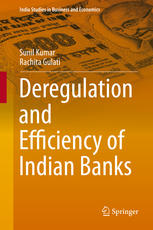

Most ebook files are in PDF format, so you can easily read them using various software such as Foxit Reader or directly on the Google Chrome browser.
Some ebook files are released by publishers in other formats such as .awz, .mobi, .epub, .fb2, etc. You may need to install specific software to read these formats on mobile/PC, such as Calibre.
Please read the tutorial at this link: https://ebookbell.com/faq
We offer FREE conversion to the popular formats you request; however, this may take some time. Therefore, right after payment, please email us, and we will try to provide the service as quickly as possible.
For some exceptional file formats or broken links (if any), please refrain from opening any disputes. Instead, email us first, and we will try to assist within a maximum of 6 hours.
EbookBell Team

4.3
38 reviews The goal of this book is to assess the efficacy of India’s financial deregulation programme by analyzing the developments in cost efficiency and total factor productivity growth across different ownership types and size classes in the banking sector over the post-deregulation years. The work also gauges the impact of inclusion or exclusion of a proxy for non-traditional activities on the cost efficiency estimates for Indian banks, and ranking of distinct ownership groups. It also investigates the hitherto neglected aspect of the nature of returns-to-scale in the Indian banking industry. In addition, the work explores the key bank-specific factors that explain the inter-bank variations in efficiency and productivity growth. Overall, the empirical results of this work allow us to ascertain whether the gradualist approach to reforming the banking system in a developing economy like India has yielded the most significant policy goal of achieving efficiency and productivity gains. The authors believe that the findings of this book could give useful policy directions and suggestions to other developing economies that have embarked on a deregulation path or are contemplating doing so.